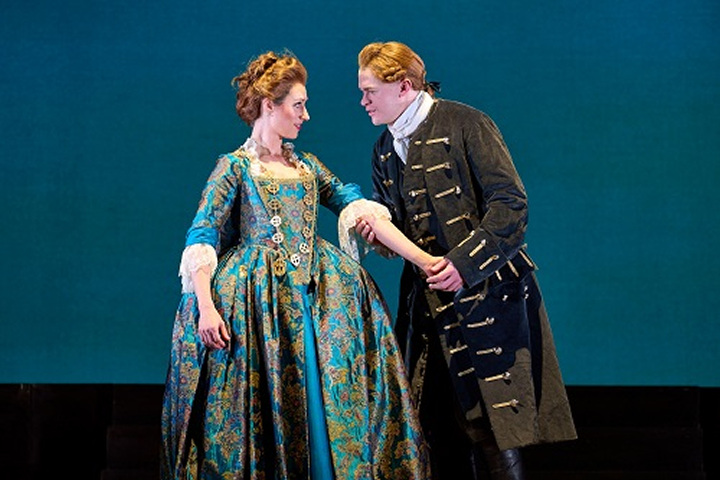| Opera Reviews | 27 April 2024 |
Refreshingly modern and relevantby Catriona Graham |
|
Handel: Giulio Cesare in Egitto |
|
 |
|
|
The story of Giulio Cesare, Egypt and Cleopatra is well-known on stage and screen, and Handel’s version, to a libretto by Nicolo Francesco Haym, is by no means the oldest. In English Touring Opera’s production, dressed in 18th century costume, director James Conway keeps it refreshingly modern and relevant. Briefly, Tolomeo seeks to curry favour with Cesare by sending the head of Pompey, who led the other side in the Roman civil war. Cesare takes the serious huff at that, as do Pompey’s widow Cornelia and their son Sesto, vowing revenge. Meanwhile, Cleopatra, coming the Big Sister on her brother, thinks to seduce Cesare to install her queen in place of Tolomeo but, as we know, the best-laid schemes .. Cordelia Chisholm’s set is uncluttered, a rectangular box with doors opening to suggest tall columns, steps to the raised stage at the back, and two or three occasional tables are the only furniture. Susanna Hurrell is a golden-haired Cleopatra, not too minx-like, who sets out to seduce the Roman from a teenage conviction of infallibility. Things change and she matures, realising that her affections are more engaged than is necessary for diplomacy, and that her brother is fighting back. Her singing is limpid, rippling through Handel’s runs with ease. Cesare (Francis Gush) is less in control of events than we would expect; his officer Curio (Edward Jowle) conducts the crowd (a locally-sourced choir) in the shouts of acclamation. He is as good as ambushed when the seduction scene is interrupted by the news that Tolomeo is attacking. Gush’s singing is a bit hesitant to begin with, but he warms up; in the mutual admiration duet with Cleopatra, the voices are well-matched, enough to tell apart while still expressing their togetherness. Alexander Chance’s Tolomeo is not so much unhinged as a spoiled brat used to getting his own way. When he doesn’t, as with his moves on Cornelia, he has a tendency to turn nasty. He locks up his sister for siding with the Romans. The scene where Cesare talks at Tolomeo (Va tacito e nascosto) has moments of hilarity, as Tolomeo tries to mirror Cesare’s movements, and there is a slick ‘chalice from the palace’ piece of business with wine glasses. Carolyn Dobbin has a delicious rich voice for the grieving widow Cornelia, conveying the right amount of outrage yet still caught up in her own grief and aware of her helplessness; her attempts to turn her son Sesto into ‘the man of the house’ and the avenger of Pompey’s death, despite his youth, are desperate. Margo Arsane, as Sesto, is supple and her anguish is convincing. For real character development, however, look to Tolomeo’s ally Achilla, sung by Edward Hawkins. Having delivered Pompey’s head to Cesare, he then admires the widow and seeks her hand, but is double-crossed by Tolomeo and sides with the Romans. Although a minor role, he makes the biggest character journey, and Hawkins does it very well. As counsellor Nireno, Kieron-Connor Valentine hovers in Cleopatra’s background, wearing ecclesiastical dress. The Old Street Band, conducted by Sergey Rybin, provides some very atmospheric playing, in particular Cesare’s Act 2 aria Se in fiorito ameno prato, duetting with a violin, and the Act 3 sinfonia is accompanied by Mark Howland’s flickering red lighting to render the battle. Appropriately, the finale has an eau de nil-coloured backdrop. |
|
Photo © Richard Hubert Smith |
|







